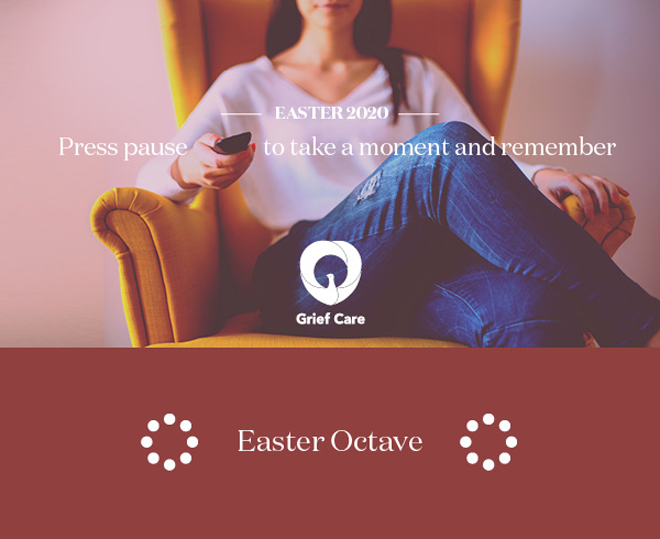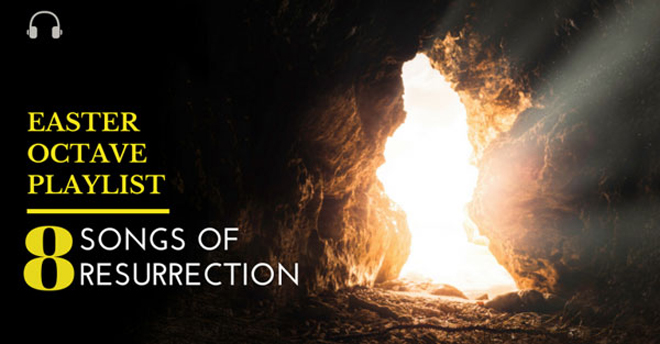The Easter Octave
A Personal Reflection – (by Msgr Graham Schmitzer)
No one saw it happen. It was an intimate moment between Jesus and his Father. So, what we have in the Gospel accounts are not the event itself, but the reactions to the event. Those first Easter witnesses all tell us something about our own witness.
The Church sees the eight days of the Octave of Easter as one day. It is as if the Church is saying that 24 hours is not enough to absorb the full meaning. Over eight days, we are presented with the different appearances of the Risen Lord. If you observe carefully, Easter week is set within the frame of two appearances in which Jesus seems to say conflicting statements.
To Mary Magdalen, on Easter Sunday, Jesus says: “Do not touch me” (Jn 20:17).
A week later, he says to Thomas, “Touch me” (Jn 20:27)
It is to a woman that Christ first appears. It would have surprised the first Christian converts, living as they did in a male-dominated society. Women could not legally witness anything. Yet it is Mary, that is chosen as the Resurrection’s first witness. We call her the Apostle to the Apostles, as the apostles first hear of this marvelous event from her.
Mary does not recognise the Risen Lord until he calls her by name. He calls each of us by name, for his call is always personal. Jesus says: “Do not hold on to me.” – meaning that her relationship with him is now to be more intimate than the physical. She knew him once in the flesh – that is not how she is to know him now. Now, she is to know him through faith-presence. This puts her on par with us.
If Mary wept for her loss of Christ for an hour, Thomas weeps for a week. Thomas is not the eternal skeptic. The Greek word skepsis simply means “doubt”, “misgiving”, “hesitation”. What is our reaction when powerful institutions suddenly crush someone to whom we have given our complete loyalty? Our immediate reaction to crisis is usually to run and hide.
Both Jesus and Thomas are wounded – Thomas more so. Jesus died from wounds inflicted by the world’s unbelief. Thomas, wounded by his inability to believe even the testimony of the other apostles, making him the Church’s first heretic. Where do we gain our faith now? From our communities of faith.
Christ’s wounds have never healed. They still have the power to heal our wounds, and our wounds heal others. For it is through our wounds that we “touch” Christ – especially through each other. We can only stand in awe of Jesus’ tender treatment of Thomas’s weakness. Therefore, his message to Thomas, “Touch me”, is not in contradiction to Mary’s, Jesus is treating two individuals in their different needs, as he treats me in my unique need.
We remain forever grateful for Thomas’ honesty. Who was he? We know little of his background, except that Thomas (Didymus in Greek) means “twin”. Who was his other half? We will find the answer by looking in the mirror. Thomas’ twin is myself – anyone, who has struggled with the pain of doubt and despair.
What is the Easter Octave?
The Easter Season is 50 days from Easter Sunday to Pentecost Sunday. The first 8 days from Easter Sunday to the 2nd Sunday of Easter is the Easter Octave. The invitation is for us to celebrate the solemnity of Easter, every day. A solemnity is festive, joyful and the highest-ranked feast following Christmas Day and Easter Sunday. Throughout the Gospel readings for the days of the octave, Jesus appears to his friends and disciples so that they might continue to share the Good News in word and deed with everyone they meet. We reflect on these readings to strengthen our own faith, inspiring us to practice our faith every day.
The Easter Octave readings offer us a spiritual essence to hold us and carry us and rejoice with us:
1st Day of the Easter Octave:
Death is not the end of the story. John 20:1-9
2nd Day of the Easter Octave:
Our God is a God of surprises! Matthew 28:8-15
3rd Day of the Easter Octave:
Walk by faith and not by sight. John 20:11-18
4th Day of the Easter Octave:
Always look for Christ in others. Luke 24:13-15
5th Day of the Easter Octave:
Look for Christ in the midst of the mess. Luke 24:35-48
6th Day of the Easter Octave:
Build your hopes on Christ. John 21:1-14
7th Day of the Easter Octave:
True strength is sharing joy, love, hope, and kindness. Mark 16:9-15
8th Day of the Easter Octave:
Doubt is not an enemy of faith, but disengagement is. John 20:19-31
Download the complete excerpt
Devotional Music for your prayer reflection:
The link below offers you some devotional music that you might like to use for your prayer reflection for this Easter Octave. View Playlist
2nd Sunday of the Easter Season – Divine Mercy Sunday
The 2nd Sunday of the Easter Season and the last Sunday of the Easter Octave is another great celebration called Divine Mercy Sunday.
You may wish to use the link below to listen to the Gospel for the Second Sunday of Easter – John 20:19-31 read by Bishop David Walker with a Lectio Reflection.
The Divine Mercy Prayer:
This Sunday is Divine Mercy Sunday and many Catholics take part in the Divine Mercy Prayer. The links below offer you the prayers sung and spoken.
Divine Mercy Chaplet – Fr Rob Galea, Natasha and Gary Pinto (Sung)
Divine Mercy Chaplet (spoken)
Celebrations! We are a joyful Easter People!
The Easter Octave and the following 42 days this year is celebrated in extraordinary times, because of the COVID19 quarantine that we are all learning to live with. The gift of this time is that we have all learnt to do Lent and the Triduum differently, now we have an opportunity to rediscover further aspects of our tradition and to “do” Easter in a new way!
Here are some activities for you to try as a family, by yourself or with the people you live with.
Before you say grace at meal times why not say, “Alleluia, Alleluia, Christ is risen” and “He is risen indeed, Alleluia, Alleluia”, Different members of the family could be the leader at different meals or on different days, or you can say this before you enjoy your own meal as an additional prayer of praise.
The beautiful tradition of decorating eggs is an activity you might like to try in this period. Pisanki (Egg Writing) symbolises the new life and transformation of the Resurrection that transforms us. The plain egg, transformed into a piece of exquisite art becomes a symbol of rebirth and renewal.
These links will show you how to do this yourself at home. The first is a short 7 step approach, the second is longer and offers some background spirituality on this art of Egg Writing called Pisanki.
Corona Virus Prayer
You are invited to join us as we pray the Corona Virus prayer daily.
Live-streamed/Televised Mass
SYDNEY St Mary’s Cathedral





